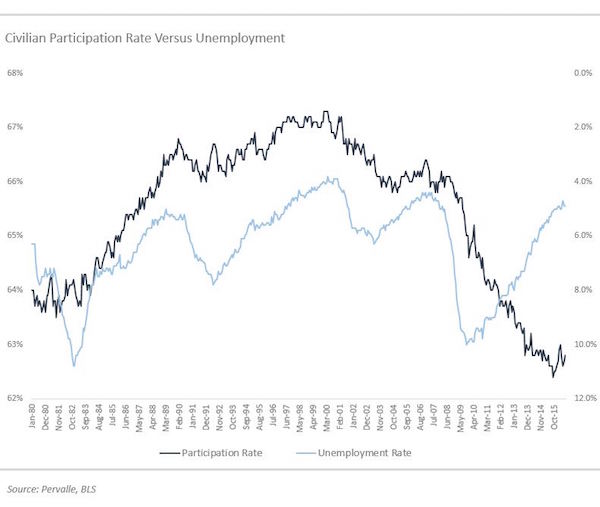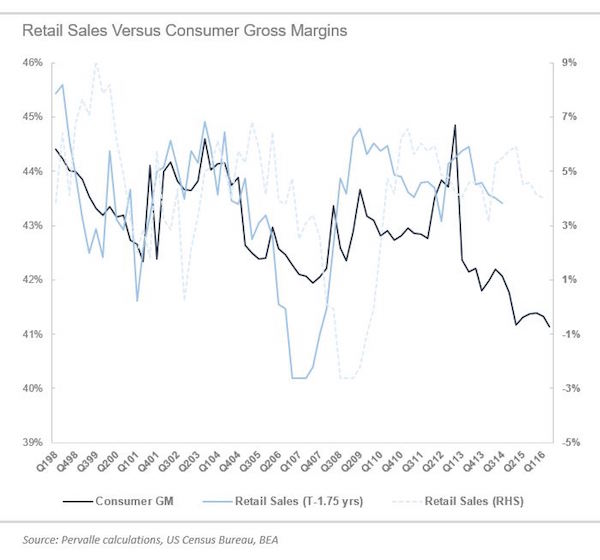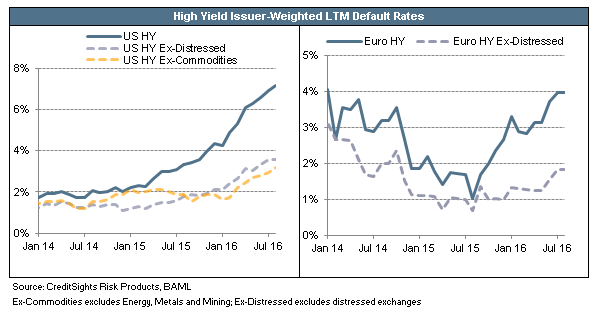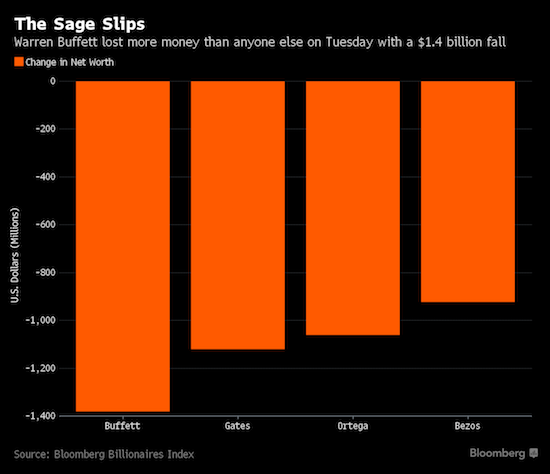
W. Eugene Smith Orson Welles 1942

Election fatigue is setting in. Good thing I’m not a lawyer.



Bob Hope Democrats
https://twitter.com/i/status/1324577385153470464

“The most startling data concerns the age group 25-44. This is a group with a Covid-related infection fatality rate of 0.0092%, which is to say barely a disease at all for nearly everyone in this group. And yet they are dying at a rate far above what is expected..”
On March 28 – very early in the pandemic – AIER published an article that I felt at the time received far too little attention. “Drugs, Suicide, and Crime: Empirical Estimates of the Human Toll of the Shutdown” by economists Audrey and Thomas Duncan cited empirical literature on the human toll of economic devastation. This article forecasted more than 100,000 excess deaths due to drug overdoses, suicide, alcoholism, homicide, and untreated depression – all a result not of the virus but of policies of mandatory human separation, economic downturn, business and school closures, closed medical services, and general depression that comes with a loss of freedom and choice.
These two economists demonstrated that as bad as a virus is, policies that wreck normal social functioning will cause massive and completely unnecessary suffering and death. Because the article was so well-cited, with references to all the available literature, I thought it would make a difference. But after it appeared, it was crickets. I was amazed. Here you have a beautiful piece of research that perfectly forecasted the nightmare being created by politicians and their advisers and it made no dent in the national narrative. Here we are seven months later and the worst has come true. These two economists should be considered prophets. Sure enough, the Centers for Disease Control has documented a shocking number of excess deaths not from Covid.
Scott Atlas summarizes:
• Hispanic: 40% excess deaths NOT Covid related
• Black: 46% NOT Covid related
• White: 38% NOT Covid related
• 25-44: 77% excess deaths NOT Covid related
• 65+: 39% NOT Covid relatedThe most startling data concerns the age group 25-44. This is a group with a Covid-related infection fatality rate of 0.0092%, which is to say barely a disease at all for nearly everyone in this group. And yet they are dying at a rate far above what is expected, and mostly from issues not related to Covid. There should not be any excess deaths. Instead we find people dropping dead in ways that are shocking.
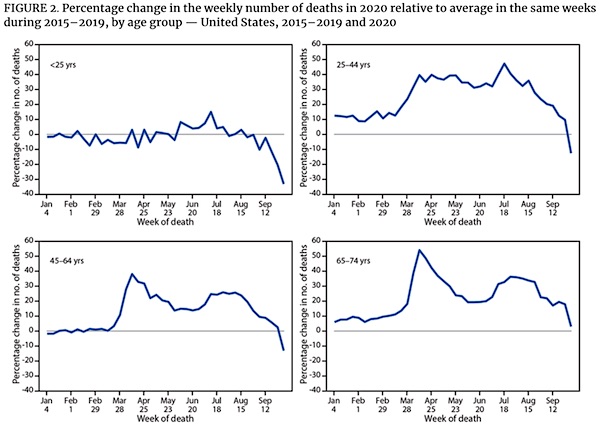

“The science is clear, but politicians are clearly no scientists.”
• China: Life After COVID Is Back To Normal (marc)
A few months ago I was lucky to get a visa to China so I could visit the country during the middle of the global pandemic. After 2 weeks in quarantine in Xiamen in late September and a total of 5 COVID tests I was finally allowed to fly to Beijing. When I landed there I had literally arrived in a different world, a world without COVID. Of course I knew that there is no COVID in China anymore, but seeing it for yourself is different. Everything is open again, even bars and clubs. Social distancing is a thing of the past, but when I arrived in Beijing most people still wore face masks, even outside. When I visited Xiamen again last week a lot less people wore them, but maybe that was also because of the much higher temperatures there. Everybody needs to have a health app installed on their phones, without it you can’t enter many public places (the app proves you have no COVID or have not been in contact with COVID-positive people) and you can’t fly without a green QR code on your app (not even if you just want to leave China).
Life is back to normal in China. Interesting is that people work from their offices again: The work-from-home phase did not last here, maybe because people only worked from home for a few weeks instead of a few months. I wonder if that will also happen in the Western world or if people will keep working remotely. Everything is open and there are hardly any restrictions left, although you still need to wear face masks in among others taxis and in school. What dit China do to get here? It’s actually quite simple, they had a complete lockdown of the whole country for a couple of weeks, and for some hotspots like Wuhan for a few months. After that they opened up again, but they did that with ubiquitous testing and obligatory face masks everywhere. Each time a new outbreak occurred they would lock (part of) a city down and test everybody. In that way China got the virus completely under control.
It may be hard to believe if you live in Europe or the US, but it is really not that hard to do. The partial lockdown in many other countries is simply not enough. It turns out that it is much better to have a shorter but very strict lockdown than to have a much longer partial lockdown that just tries to ‘flatten the curve’. I think Europe and the US are shooting themselves in the foot by trying to remain open for business. The long term effect in the Western world will simply be much worse than the short term effect in China.I am actually flabbergasted that the Western economies don’t see this and don’t copy the China playbook. I have argued for a short but full lockdown on Twitter since March, but most people did not take it serious. Of course it’s not the full story, China also had face masks from day one, while many other countries still don’t seem to ‘believe’ in them (although that finally started to change after the summer). The science is clear, but politicians are clearly no scientists.
And of course you need testing capacity, something that seems impossible to scale up in many Western countries. The virus started in January and soon after that it became clear to me that this could be a global danger. As I noted on Twitter, face masks were sold out in Vancouver on January 25 already, simply because most Chinese in Vancouver also saw the risk and started buying them. But governments took a full 6-7 weeks before they started to take it more serious. They lost so much precious time, instead of getting face masks ready and prepare test facilities they downplayed the risk. It was hard to believe for me, but I realized (once again…) that you should never rely on politicians for information but do your own research.

No idea what to make of this, can’t trust western media to say one true thing about Putin, but I do like Scott Adams’ take.
• Vladimir Putin ‘Will Quit In January Amid Fears of Parkinson’s Disease’ (DM)
Vladimir Putin will quit in January amid fears he has Parkinson’s disease, Moscow sources have claimed. The 68-year-old strongman president of Russia is being urged to retire by his former gymnast lover Alina Kabaeva, 37, insiders say. Recent footage of Putin’s legs moving around as he gripped onto the armrest of a chair have raised eyebrows. Eyes are also drawn to a twitching pen in the former KGB operative’s fingers and a cup which analysts told The Sun was filled with painkillers. Earlier this week it emerged that unexpected legislation was being rushed through to ensure that Putin could be made a senator-for-life. The new draft legislation was introduced by Putin himself, and would guarantee him legal immunity and state perks until he dies.
State-run RT media forecast the move will be seen ‘as a sign that the groundwork is being laid for an eventual transition of power in Russia’. It is not the first time that people have speculated that Putin may be suffering from Parkinson’s disease. Others have previously noted his ‘gunslinger’s gait’ – a clearly reduced right arm swing compared to his left, giving him a lilting swagger. An asymmetrically reduced arm swing is a classic feature of Parkinson’s and can manifest in ‘clinically intact subjects with a predisposition to later develop’ the disease, according to the British Medical Journal.
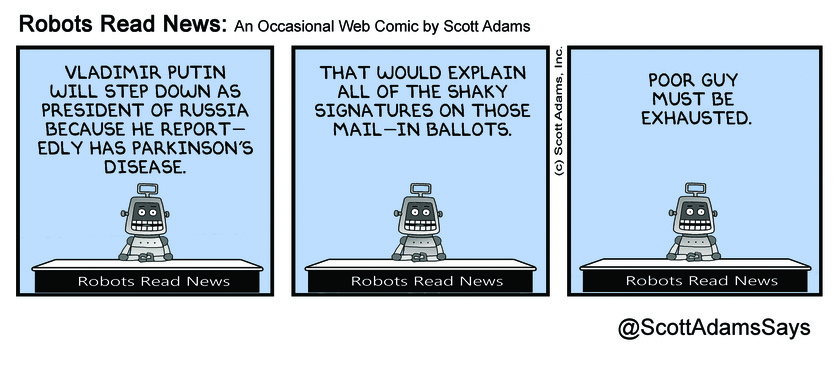

“There were so many serious analyses wondering what could be done to convince Homer Simpson not to vote Trump that it soon became clear Bart’s donut-loving Dad was the closest thing to a Trump voter most educated people could relate to, or knew even.”
• Which is the Real “Working Class Party” Now? (Taibbi)
In an irony he is humorously ill-equipped to appreciate, Donald Trump by losing this week may have gained something for the Republican Party bureaucracy he took such pleasure in humiliating four years ago: a future. Defying years of muddle-headed media analyses, Trump underperformed with white men, but made gains with every other demographic. Some 26 percent of his votes came from nonwhite Americans, the highest percentage for a Republican since 1960. The politician who became instantly famous — and infamous — by saying of Mexican immigrants, “They’re bringing drugs, they’re bringing crime, they’re rapists,” performed stunningly well with Latino voters.
Exit polls, which can be unreliable, pegged his national support at 32%-35% of the Latino vote. More tellingly were results in certain counties. Starr County, Texas, the county with the highest percentage of Hispanic or Latino voters – above 95% – voted for Hillary Clinton by a 60-point margin in 2016, but went for Biden by just five points in 2020. Even more amazing was Trump’s performance among Black voters. The man whose 2016 message to “the blacks” was very nearly a parody of long-ago New York mayoral candidate Mario Procaccino’s pledge that “My heart is as black as yours” must have found a new way to connect. Trump doubled his support with Black women, moving from 4% in 2016 to 8%, while upping his support among Black men from 13% to 18%. Remember, this was after four years of near-constant denunciations of Trump as not just a racist, but the leader of a literal white supremacist movement.
Trump’s numbers with the LGBTQ community were a stunner also, jumping from 14% to 28%. In September, a dating app for queer men called Hornet ran a survey that showed 45% support for Trump among gay men. Ever since Trump jumped into politics, media observers have rushed to denounce any Trump-related data that conflicts with conventional wisdom, and the Hornet survey was no different. Out magazine quoted a communications professor from Cal Poly Pomona as saying, “To tout a Hornet poll as evidence of LGBTQ support for Trump is clickbaity, sloppy journalism.” Even the Hornet editor scoffed at his own poll, before it all turned out to be true in the election.


“If you count the legal votes, I easily win..”
• President Trump Delivers Remarks About The Election From White House
As the nation continues waiting to find out who will win the 2020 presidential contest, President Trump on Thursday delivered remarks from the White House. “If you count the legal votes, I easily win,” Trump said. “If you count the illegal votes they can try to steal the election from us, if you count the votes that came in late,” he said. The president said that election polling was weaponized to harm his candidacy. “As everyone now recognizes media polling was election interference, in the truest sense of that word,” Trump said. “By powerful special interests, these really phony polls…were designed to keep our voters at home, create the illusion of momentum for Mr. Biden and diminish Republicans’ ability to raise funds. They were what’s called suppression polls, everyone knows that now.”
“So it will be hopefully cleared up, maybe soon, I hope soon,” he said. “But it’ll probably go through a process, a legal process and as you know I’ve claimed certain states and he’s claiming states…but ultimately I have a feeling judges are gonna have to rule. But there’s been a lotta shenanigans and we can’t stand for that in our country.”

Jo Jorgenson losing half her support in the space of 12 minutes

Georgia count just flipped to Biden.
• Trump Gets ‘Big Legal Win In Pennsylvania,’ Setback In Michigan, Georgia (RT)
As Donald Trump continues to accuse Democrats behind Joe Biden of trying to “steal” the presidential election, he celebrated a “big legal” win in his Pennsylvania lawsuit. “Big legal win in Pennsylvania!” the president tweeted on Thursday, following orders mandating certain mail-in ballots to be placed aside for the time being and allowing Republican poll watchers to observe more closely as votes are counted. It remains to be seen how this “big legal win” will benefit Trump, but it does ensure that it could be even longer before people know who has won the presidential race. Mail-in ballots in Pennsylvania, a key swing state that remains up for grabs, that lack identifying information from their voter will be placed aside and not counted until the court gives further guidance on what to do.
Once ballots are “segregated,” those with information that cannot be confirmed by November 9 will “not be counted until further notice” from the court. Pennsylvania Commonwealth Court has also ordered that Republican poll watchers will be able to observe ballots being counted in Philadelphia from a distance of six feet following complaints that they were being kept too far away from the actual counting. In Michigan, the president has faced a setback with a judge scoffing at Trump’s lawsuit to stop the count in the state due to allegations voter fraud. Michigan Court of Claims Judge Cynthia Stephens said on Thursday she will deny Trump’s request as the accusations of voter fraud are “hearsay” and contain no “firsthand knowledge.”
Michigan has been called in Joe Biden’s favor by multiple US outlets, but Trump has claimed victory in the state, blaming last minute “ballot dumps” on the former vice president’s surge on the night of the election. Earlier, a judge in Georgia also dismissed lawsuit by Trump campaign that requested to ensure that state laws were followed in regards to absentee ballots. Trump’s campaign has also said they will be demanding a recount in Wisconsin, which Biden reportedly won by around 20,000 votes. The incumbent president has also alleged in another lawsuit that thousands of people voted in Nevada who are not residents there.

Will they oust Pelosi?
• Dems Melt Down On Conference Call Over Losing House Seats (RT)
Rep. Abigail Spanberger (D-Virginia), who is leading her congressional race by a thread, has reportedly blamed the Democrat Party for losing elections “we shouldn’t have lost” due to embracing radical ideas like Defund the Police. During a conference call between Democrats discussing the results of various 2020 elections, Spanberger claimed she nearly lost her race (she’s won by a few thousand votes) because of an attack ad connecting her to the Defund the Police movement. “Don’t say socialism ever again,” the congresswoman said on the call, according to Washington Post reporter Erica Werner.
“We need to be pretty clear … it was a failure. It was not a success,” she added about election night. While the results of the presidential race remain unclear, Democrats had a disappointing election night regardless, as they failed to gain control of the Senate and actually ended up losing seats in the House, where they still remain the majority party. Werner reported that Spanberger did not find a lot of support on the call, with Speaker of the House Nancy Pelosi (D-California) openly disagreeing with the assessment, and Rep. Rashida Tlaib (D-Michigan) pushing back and saying former President Barack Obama was called a Muslim and socialist without being connected to movements like Black Lives Matter or Defund the Police.

The totally insane idea that Corbyn is an anti-semite has been as hard to kill by evidence in the UK as Russiagate is in the US and UK. And several lies about Assange. The media has become toxic.
• EHRC Antisemitism Report Added Fire To Labour’s Simmering Civil War (Cook)
It was easy to miss the true significance of last week’s Equalities and Human Rights Commission (EHRC) report on the British Labour Party and antisemitism amid the furore over the party suspending its former leader, Jeremy Corbyn. The impression left on the public – aided by yet more frantic media spin – was that the EHRC’s 130-page report had confirmed the claims of Corbyn’s critics that on his watch the party had become “institutionally antisemitic”. In fact, the watchdog body reached no such conclusion. Its report was far more ambiguous. And its findings – deeply flawed, intentionally vague and glaringly inconsistent as they were – were nowhere near as dramatic as the headlines suggested.
The commission concluded that “there were unlawful acts of harassment and discrimination for which the Labour Party is responsible”. Those failings, according to the commission, related to the handling of antisemitism complaints, interference by the leader’s office in the disciplinary procedure, and “unlawful harassment” by two Labour Party “agents”. None of that seemed to amount to anything like the supposed claims of a “plague” and “tidal wave” of antisemitism that have dominated headlines for five years. Paradoxically, the equalities commission’s conclusions sounded a lot like Corbyn’s statement that the scale of Labour’s antisemitism problem had been “dramatically overstated”. That remark quickly became grounds for the party suspending him.
So sustained has the furore about “institutional antisemitism” been in Labour that, according to a recent survey by academics Greg Philo and Mike Berry, the British public estimated that on average a third of Labour members had been disciplined for antisemitism – more than 300 times the real figure. But in the end, the commission could identify only two cases of unlawful antisemitism the party was responsible for. According to the report, there were 18 “borderline” cases, however, “there was not enough evidence to conclude that the Labour Party was legally responsible for the conduct of the individual.”

“The Government also has to consider the political consequences of continuing to throw stimulus at construction over other sectors that are in pain..”
Sorry, but that government is stuck in a corner.
• Australian Property Bubble Hasn’t Yet Burst Amid The Pandemic (Abc.au)
After years of dire predictions that Australia’s property bubble could burst, national house prices continue to withstand the otherwise devastating impact of the coronavirus pandemic, and once again the doomsayers have been proven wrong. Data released this week from CoreLogic shows the national average rose 0.4 per cent in October, following five months of national declines during the COVID-19 pandemic. Every state across Australia (except for Melbourne which suffered the impact of a second COVID lockdown) experienced gains. But how long will the good run last? It’s a question I asked AMP Capital chief economist Shane Oliver, who in late March at the onset of the pandemic in Australia, had warned that house prices could plummet by 20 per cent in a worst-case scenario.
In response to my question, Dr Oliver jokes that when people get their Australian citizenship, it should come with a written warranty saying, ‘Congratulations, you are now guaranteed to live in a country where house prices will continue to rise’. He says over the years regulators and government have always stepped in and introduced measures that stopped the bubble bursting. These range from interest rate cuts, tax incentives for property investors and other measures aimed at propping up construction. During the early 1990s recession, the level of household debt in Australia was around 40 per cent of income, he says, whereas now it is close to 200 per cent — one of the highest levels in the world.
“Each time there’s a downturn people get worried about debt and pay some of it back, but before things go too far [into the positive], the Reserve Bank cuts rates and people start borrowing again — we go back to a new level of debt and it starts the cycle again.” [..] But Dr Oliver and other economists also warn that in the current environment there are limits to how fiercely regulators and governments can fuel house prices. Interest rates are near zero, and tax incentives aimed at housing are already generous (with calls to wind them back as part of a wider tax reform package). The Government also has to consider the political consequences of continuing to throw stimulus at construction over other sectors that are in pain. In short, the pandemic has created several reasons to maintain a level of cynicism about the future of house prices.

“..the CDC quickly reversed its support for the decision, then went back and supported it again, then did it again, etc.”
• Experts Want 15 Days Of Counting To Flatten The Curve Of Votes For Trump (BBee)
After a concerning spike in votes for Trump occurred on election night, experts are calling for 15 days of counting to flatten the curve of votes for the “wrong candidate.” While some scientists recommended just letting the votes for Trump be counted fairly until we all achieve herd immunity to Trump, others said we need to lock down the vote-counting places, and make sure no one can get inside, in order to kill off the virus of Trump. “If we all band together and allow just 15 days of counting, we can flatten the curve of votes for Trump,” said Dr. Fauci. “And we also advise Trump supporters to wear airtight masks. For, you know, science.”
The CDC, WHO, and China are all backing the plan, saying it is “SCIENCE!” and anyone who is opposed to it is “ANTI-SCIENCE!” However, the CDC quickly reversed its support for the decision, then went back and supported it again, then did it again, etc. At publishing time, the experts had revised their recommendation to at least 8 months of counting to flatten the curve.

We try to run the Automatic Earth on donations. Since ad revenue has collapsed, you are now not just a reader, but an integral part of the process that builds this site.
Click at the top of the sidebars for Paypal and Patreon donations. Thank you for your support.

Bill Barr in September on mail-in ballots
https://twitter.com/i/status/1324438683336929281



Support the Automatic Earth in virustime, election time, all the time. Click at the top of the sidebars to donate with Paypal and Patreon.



